Axepta Online offers daily reconciliation reporting (Settlement File).
The Settlement File brings together all the data of the different payment methods used by the merchant to meet his reconciliation and reporting needs. Clearing and settlement information is retrieved from individual payment service providers and acquirers.
The file is in a Comma Separated Values (CSV) format.
This step-by-step documentation explains the steps to recover the Settlement File when it is made available on an Axepta sFTP.
This file recovery method requires the generation of SSH and PGP key pairs that will be used to:
- The establishment of a secure connection between the merchant's information system and the Axepta sFTP server
- The decryption of the reconciliation file generated by Axepta
Implementation steps
- The Merchant contacts Axepta Support to request the availability of the reconciliation file via sFTP
- Axepta Support contacts the Merchant and asks him to send his SSH and PGP public keys
- The Merchant creates his SSH and PGP key pairs. He only transmits his public keys to Axepta Support
- Axepta Support performs the appropriate configuration
- Axepta Support sends Merchant Axepta sFTP connection data
- The Merchant establishes the connection between his information system and the Axepta sFTP, recovers the encrypted file and decrypts it
Detailed description of each step
Step 1: Request to make the reconciliation file available via sFTP
The request to make the reconciliation file available via sFTP is sent by email to Axepta Support.
Step 2: Request to send SSH and PGP public keys
In response, Axepta Support contacts the merchant by email so that he can send him his SSH and PGP public keys.
This email also contains the Axepta Online public key which will be used only in case the merchant wishes to carry out operations via Batch.
Example of a public key request template issued by Axepta Support
Please note the following information in order to set up the provision of reconciliation files via sFTP:
- Please find our public key attached.
- Please provide us with your PGP public key in .asc format (with an RSA length of at least 4096 Bit).
- Please send us a public SSH key in .ssh format (the command for creating an SSH key is as follows: ssh-keygen -b 4096 -t rsa).
It is necessary to assign an email address to your public PGP key as it will act as an identifier.
We recommend that you do not use a private email address but an email address from the company's domain.
We will complete the configuration of your account and send you your access data by e-mail after receiving your data.
Step 3: Generate SSH and PGP key pairs and send to support
Step 3.1: Generate Key Pairs
The Merchant (its integrator or IT department) generates SSH and PGP key pairs.
SSH and PGP systems use so-called asymmetric encryption modes characterized by the use of a key pair.
This pair is composed of:
- an encryption key called a public key
- a decryption key called a private key
Using keys
- SSH keys are used to secure exchanges (inc. authentication) between the merchant's information system and the Axepta sFTP server
- PGP keys are used to encrypt and decrypt the reconciliation file.
Prerequisite:
- The command for creating an SSH key looks like this: ssh-keygen -b 4096 -t rsa.
- The PGP key must have an RSA length of at least 4096 Bit.
- The PGP key must be in .asc format
Step 3.2: Send to Support
The merchant sends his SSH and PGP public keys to Axepta Support, specifying his MID.
